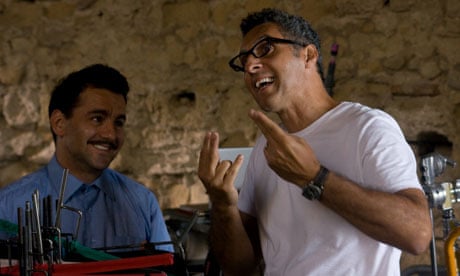My family is originally from Sicily and my father was from Puglia. My cousin Aida is half Neapolitan. Most of the Italians in New York are from Naples, Sicily and Calabria – the south. Naples itself reminds me a little bit of New York in the 70s, except everyone is crushed together more. It's so beautiful and so dangerous. It has a brutality, but also a sense of poetry – plenty of writers have lived there and written about it. Neopolitans have their own language and, most importantly, the people are unbelievably musical. The relationship between classical and popular music goes back a long, long time. Many classical musicians (and some great opera singers) have sung popular Neapolitan songs throughout the years.
That's why I wanted to make a film about the city and its music. The kind of crime world we've all seen in Gomorrah is part of the culture in Naples, but music is vital. They co-exist. Besides basic things such as shelter and food and family, music is what matters. If you sing a song on the streets, people will pick right up on it and sing along, whether you're a good singer or not. If you want to, you can go out on the street and get somebody to dance with you; it's really not that hard.
My own introduction to Naples proper came through cinema: I worked with Francesco Rosi on the adaptation of Primo Levi's The Truce. Through Francesco I encountered the work of the dramatist Eduardo de Filippo, and acted in a play of his, Questi Fantasmi (Three Ghosts), which contained a great deal of Neopolitan music. We took the play to Naples and it was really an experience. The truth is that Naples is a complicated culture, and it comes out in the music. It can be moving and emotional, really sexy and funny, but there is a tremendous amount of irony. There's a famous song called Dove Sta Zaza, and the lyric is essentially a man calling to his lover: "Where are you? I need to find you – but if I can't find you, I will have your sister." Interestingly, the irony is lost when the song is transplanted, because people turn it into a longing for a place they miss.
We started out shooting a straight documentary but, as we went along, we realised we were making a musical adventure. One of our main inspirations was Norman Lewis' travel book, Naples '44, about his time in the city during the second world war. I've been in talks to make a movie of the book, but it would be very hard as it's so episodic and the writer's touch is so delicate. And you'd need a lot of money.
One thing we couldn't do was shoot the miracle of liquefaction, which takes place twice a year at the Naples cathedral. We were there when it took place – they bring out a vial of the dried blood of Saint Januarius, and if it doesn't liquefy then legend has it disaster will befall the city. The jury is out as to whether it is a genuine miracle, but it made an impression on me.
Our aim was to make something along the lines of Buena Vista Social Club; as I say in the film, music is emotional transportation – it's food for the soul. It's one way to compete against the films that have so much money and special effects and action. I've had to do them myself: I'm just finishing off the third Transformers movie. The truth is, it's almost impossible to make a medium-sized film in the current climate. It's a tough time and a lot of companies have closed. Even Spike Lee has trouble raising money. You've got to find other ways of doing things – and doing Passione was fantastic for all of us.
Passione premiered in Venice this week. John Turturro was talking to Geoffrey Macnab.
